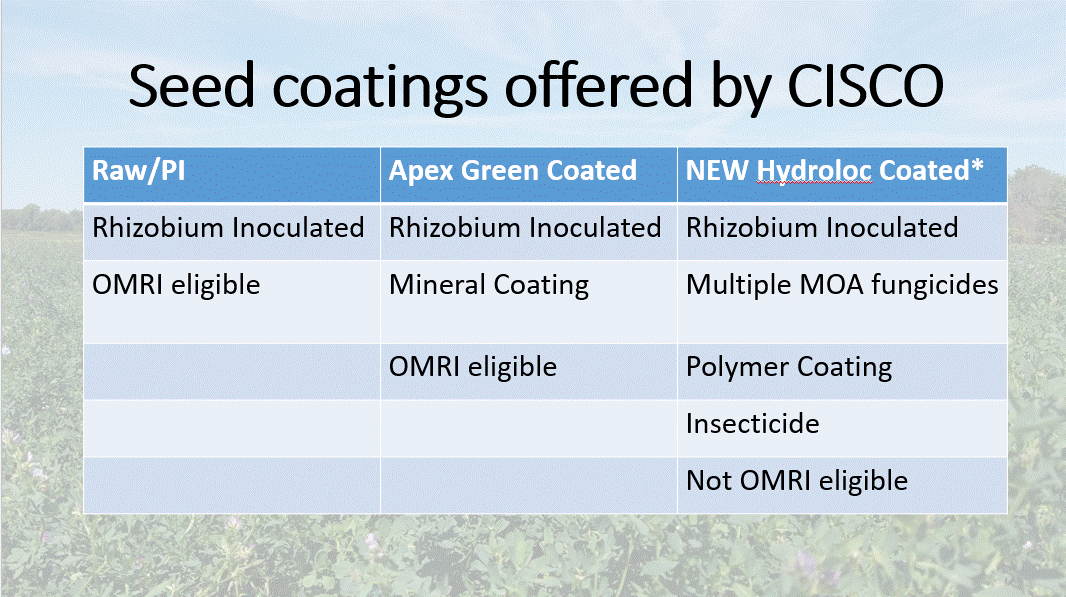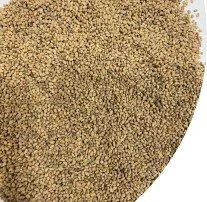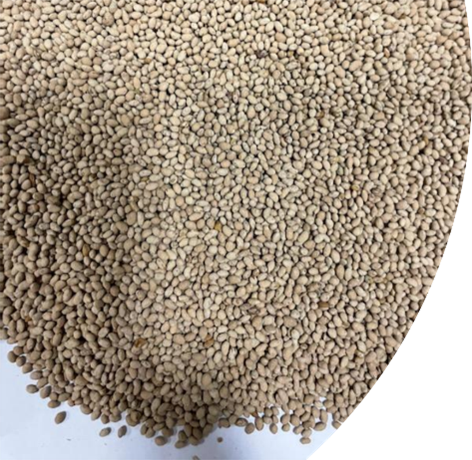by Dustin Johnson
As winter gets underway, my thoughts have turned forward to the upcoming spring, warm weather, and planting my crops. I’ve already spent a lot of time thinking about which varieties to plant on each field, but my selection of seed coatings can sometimes be last-minute. Please continue reading for an in-depth discussion of seed coatings and choices offered by CISCO seeds.
All alfalfa and clover seed sold by CISCO comes treated with a species-specific rhizobium inoculant to ensure that they can form root nodules and successfully fix atmospheric nitrogen to nourish the plants. Successful nodulation is necessary to have any viable legume crop. In addition to a seed treatment, many seeds offered by CISCO are coated in a mineral or polymer-based coating, which offers the following benefits:
Protect The Seed
Seed coatings enhance the ability of the natural seed coat to perform its role in the germinating seed. It enhances the physical barrier to harmful bacteria and fungi, draws moisture to the seed, and buffers against local irregularities in pH and salinity. This is especially important if you plan to apply fertilizer at seeding.
Protect The Inoculant
A successful stand of alfalfa or clover requires successful inoculation of the correct species of rhizobium bacteria. The living bacteria present in seed inoculant is quite vulnerable to environmental changes in pH, temperature, and salinity. It’s important to remember that root infection does not happen immediately at germination. The inoculant will need to remain viable and kept near the emerging roots for up to a month before the alfalfa root makes itself available to be infected by this beneficial bacteria. Using a seed coating is the best way to ensure the rhizobium’s success.
Make The Seed Bigger
The “number one” reason forage seedings fail is poor seed-to-soil contact. Coated seeds offered by CISCO are 34% heavier than raw seeds. Adding mass to very small seeds leads to improved seed-to-soil contact and more consistent planting depth. If the weather turns hot and dry, the thicker seed coating helps the seed resist desiccation for a longer period of time. Larger seeds are simply easier to plant. Most planting equipment is designed for seeds that are larger and heavier than alfalfa and clover seeds. Coated seeds flow, meter, and spread much better than uncoated seeds.
Achieve Results
According to research done by our partners at WL Alfalfa, 20-40% of uncoated alfalfa seeds become successful alfalfa plants, while 50-75% of coated alfalfa seeds become successful plants. In my own experience, emergence of coated seed happens more quickly and evenly than uncoated.
It’s true that a 50 lb bag of uncoated seed contains more seeds. However, a 50 lb bag of coated seed likely contains more alfalfa stand. Perhaps most importantly, data from the CISCO warehouse shows that we sell less replant seed in varieties more commonly sold as coated seed. Seed coating protects your seed investment and increases your odds of successfully establishing a new stand of alfalfa or clover.



